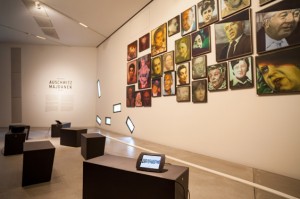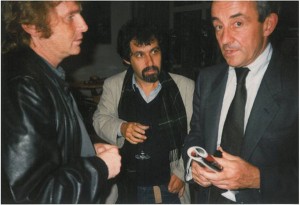During the week of 21 to 27 October 2013, the Academy of the Jewish Museum Berlin, in cooperation with Kulturkind e.V., will host readings, workshops, and an open day for the public with the theme “Multifaceted: a book week on diversity in children’s and young adult literature.” Employees of various departments have been vigorously reading, discussing, and preparing a selection of books for the occasion. Some of these books have already been introduced here over the course of the last weeks.

Unlike German literature for young adults, the range of children’s books on the subject of diversity is still marginal. Usually books about diversity are transposed to the animal kingdom, or they depict ‘alien’ cultures by having foreign children invite their German school friends to an ethnic celebration. The Jewish Passover holiday, the Muslim Eid-al-Fitr, or, alternatively, the Chinese New Year, are described with one and the same formula: mom prepares the celebratory meal, dad explains the origins of the holiday, and the kids watch the central rites until they have to go to bed. Most of these books have no real plot.
Ingke Brodersen chose a different approach: she tells her story from the perspective of a little boy named Sascha, who emigrated from Russia to Berlin. → continue reading

Area on the Majdanek Trial in the permanent exhibition
© Jewish Museum Berlin, photo: Alexander Zuckrow
Forty-four portraits have been mounted in the permanent exhibition over the last few weeks. They are a series of paintings by Minka Hauschild, called “Majdanek Trial Portraits,” and they show the participants of the Majdanek Trial, that took place at the regional court in Dusseldorf from 26 November 1975 until 30 June 1981. Standing in front of the wall of portraits, viewers are left to wonder: “Who is who, here?” The paintings themselves don’t reveal whether the subject was a former prisoner or an SS officer. Some portraits are realistic, but others seem distorted or blurred to the point of being unrecognizable. All of the people portrayed appear to have been damaged in some way. The portraits are deeply disturbing.
Our visitors can find out on iPads lying on the benches nearby whether a given painting depicts a judge, a lawyer for the defense, a witness, or a defendant. Each individual’s role in the Majdanek trial is described here and insight is provided into their biography as well as – where the sources permit – their own perception of the proceedings. → continue reading
10 April, 1946 – 9 August, 2012

Ronny Loewy (in the middle) with the director Louis Malle (r.) and Daniel Cohn-Bendit (l.) at the German premiere of “Au revoir les enfants,” 1987, courtesy of Gisela Geier-Loewy
On August 9 of last year, film historian Ronny Loewy died. He was a remarkable person and a friend of this museum, who supported and inspired our work from the beginning: it was Ronny who selected many of the film excerpts that appear in our permanent exhibition or appeared in the special exhibition “Home and Exile”. He also published, among other things, Tereska Torrès’s film diary Unerschrocken: Auf dem Weg nach Palästina (Unafraid: On the Way to Palestine) about the illegal emigration of Displaced Persons to Palestine in 1947 and 48. Ronny was a colleague and friend, with whom we not only worked but also shared many experiences and much laughter, who constantly opened our eyes to the new and unusual, the forgotten and overlooked, little details from films, and above all to the people behind these moving pictures.
We therefore wish to dedicate space on this blog today to remembering him and his life, one year after his death: → continue reading


